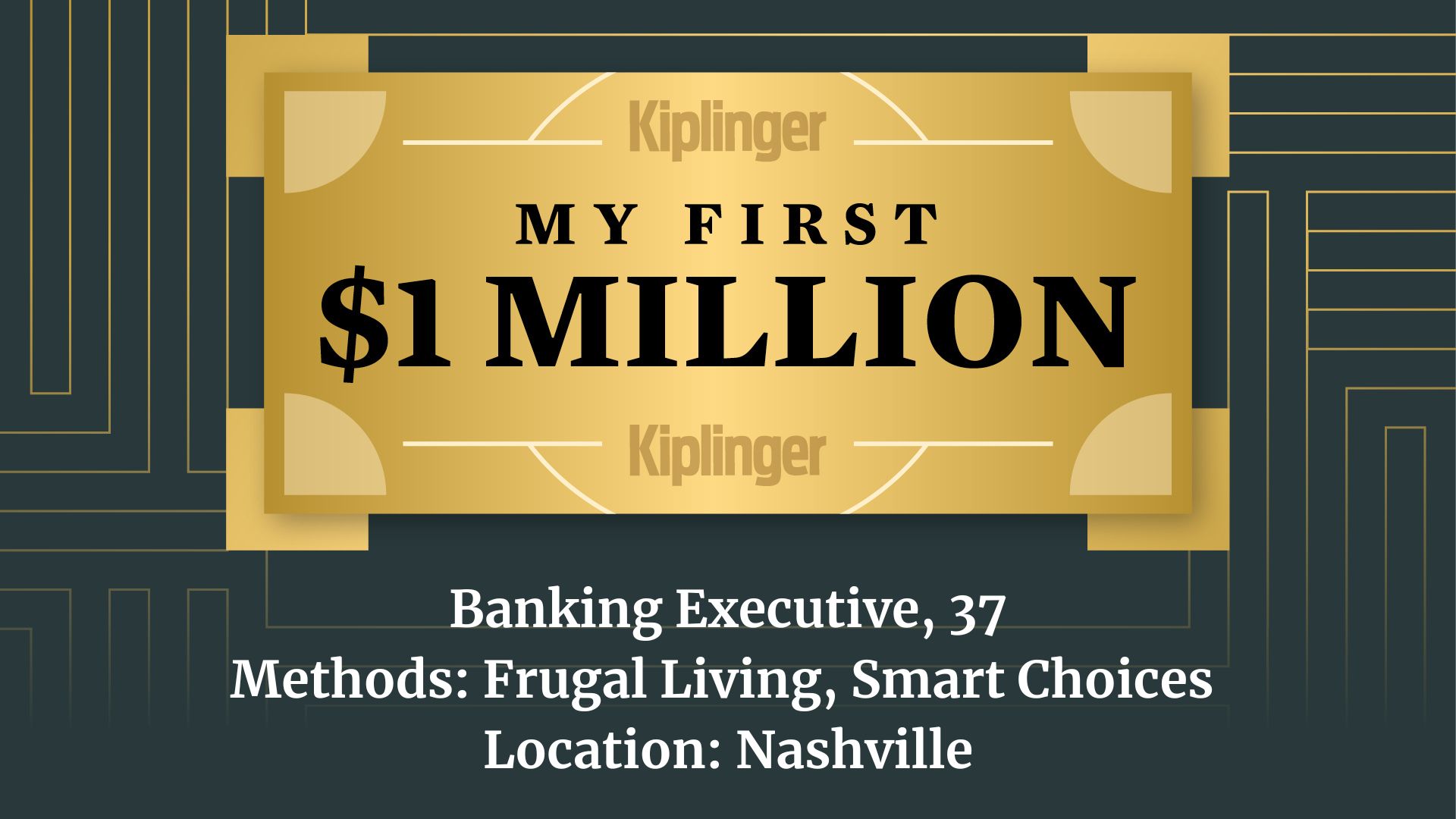Best National Banks 2025
Here's Kiplinger's pick of the best national banks that offer a wide variety of accounts and services.

Profit and prosper with the best of Kiplinger's advice on investing, taxes, retirement, personal finance and much more. Delivered daily. Enter your email in the box and click Sign Me Up.
You are now subscribed
Your newsletter sign-up was successful
Want to add more newsletters?
National banks offer a wide variety of accounts and services, including wealth and investment management. Here's Kiplinger's pick of the best.
Are you looking for a better bank? You’re in the right place.
With the help of Curinos, a financial-data provider, we’ve analyzed accounts at 40 financial institutions, evaluating them based on criteria including fees, minimum balance requirements, yields and the availability of extra perks, such as free checks or financial planning services. (For more on how we judged the contenders, see the methodology below.)
From just $107.88 $24.99 for Kiplinger Personal Finance
Become a smarter, better informed investor. Subscribe from just $107.88 $24.99, plus get up to 4 Special Issues

Sign up for Kiplinger’s Free Newsletters
Profit and prosper with the best of expert advice on investing, taxes, retirement, personal finance and more - straight to your e-mail.
Profit and prosper with the best of expert advice - straight to your e-mail.
We used this information to find you the best national banks. These big brick-and-mortar institutions have branch networks in many states and offer a range of services, from basic checking and savings options to premium accounts with numerous benefits. A couple of the top banks even offer a free, no-strings checking account — an uncommon find among large institutions.
BMO Bank
Standout account: Smart Advantage Checking is free, with no monthly maintenance fee or required minimum balance.
Where it is: More than 1,000 branches across two dozen states, with many locations in the Midwest as well as the western U.S. (Rates and terms are for customers in Chicago.)
BMO’s most popular checking account, Smart Advantage Checking, charges no monthly fee, no matter your balance. For customers who can maintain a sizable balance, Relationship Checking is worth a look. You can avoid the $25 monthly fee if you keep a minimum $10,000 balance in the account or a combined $25,000 in eligible BMO deposit and investment accounts. All account holders qualify for perks including up to $25 reimbursed monthly for out-of-network ATM charges and free cashier’s checks, money orders and incoming wire transfers. Depending on your combined account balances, you may get other benefits, too. If you have $25,000 to $99,999 in quarterly combined balances, for example, you qualify for the Gold tier, which includes a rebate of $30 monthly on outgoing wire transfer fees.
BMO’s Savings Builder account is free, and during the first year you have it, BMO contributes an extra $5 for each month that you save $200 or more. The Growth Money Market account yields 2.94% if you have a Relationship Checking account and a balance of at least $250,000; BMO waives the $10 monthly fee if you have a $5,000 daily balance. Among BMO’s cert-ificates of deposit, the CD Specials recently offered the most attractive rates, including 3% on a 13-month maturity ($1,000 minimum deposit).
Fifth Third Bank
Standout accounts: Momentum Checking is free. The bank’s promotional CDs recently yielded as much as 4.35%.
Where it is: Nearly 1,100 branches in 11 states in the Midwest and South. (Rates and terms are for customers in Columbus, Ohio.)
Fifth Third’s Momentum Checking is a great option if you’re looking for a free, basic checking account. Preferred Checking lets you skip the $25 monthly fee if you have a combined deposit and investment balance of $100,000, and it has plenty of perks. They include reimbursement of surcharges for up to 10 monthly out-of-network ATM withdrawals; complimentary standard checks, notary services, cashier’s checks, money orders and incoming wire transfers; discounted rates on Fifth Third loans; personalized guidance from a team of investment professionals; free self-directed online trades in a brokerage account; and free or discounted identity theft protection services.
If you have a qualifying Fifth Third checking account, you won’t pay the $5 monthly fee on a Momentum Savings account. You can also skirt the monthly fee if you maintain a $500 monthly balance, or if you’re younger than 18 or enrolled in Fifth Third’s Military Banking, for current and former servicemembers. The Relationship Money Market has the same requirements to avoid the fee. But recently, both accounts yielded just 0.01%. The promotional CDs, however, have attractive yields, including 4.35% on a three-month maturity ($5,000 minimum deposit).
TD Bank
Standout account: With the Complete Checking account, you have several options to avoid the monthly fee; one is maintaining a daily balance of $500.
Where it is: More than 1,100 locations in 15 states on the East Coast as well as in Washington, D.C. (Rates and terms are for customers in Cherry Hill, N.J.).
TD Bank’s Complete Checking is a solid everyday account that lets you skip the $15 monthly service fee by meeting one of these monthly requirements: Make direct deposits of $500 or more, maintain a daily balance of $500 or more, or keep a $5,000 combined minimum daily balance in TD personal deposit accounts. It’s also a good starter account for young adults, charging no monthly fee to customers between the ages of 17 and 23. TD’s Beyond Checking account offers additional benefits; for more, see the section on banks and accounts for retirees.
The Simple Savings account has a $5 monthly fee, but you can bypass it if you maintain a $300 daily balance or link it to a Complete or Beyond checking account. The fee is also waived if you’re 18 or younger or 62 or older. With the Signature Savings account, you can skip the $15 monthly fee if you have a $10,000 daily balance or link it to a Beyond or Complete checking account. If you have a balance of at least $100,000 and link the account to another eligible TD checking account or loan, you get a 3% yield.
Methodology
With data from Curinos, a financial-data provider, as well as from financial institutions and other sources, we evaluated 13 national banks, 14 internet banks (including online accounts from brokerage firms) and 13 credit unions.
We reviewed checking accounts, savings accounts, money market deposit accounts and certificates of deposit from each institution. We looked at interest rates; minimum deposit and balance requirements; monthly maintenance fees and the ease of waiving those fees; ATM benefits, such as waived or reimbursed fees for out-of-network withdrawals; free or discounted benefits, such as personal checks, cashier’s checks, paper statements and overdraft-protection transfers; overdraft fees and concessions, such as cushions; and online and mobile banking features, such as the availability of peer-to-peer payment services. Yields and other data listed in the article are as of early July.
Kiplinger's Best Banks
- Best Internet Banks
- Best Credit Unions
- Best Banks for High-Net-Worth Clients
- Best Banks for Retirees
- Best Banks for Travelers
Note: This item first appeared in Kiplinger Personal Finance Magazine, a monthly, trustworthy source of advice and guidance. Subscribe to help you make more money and keep more of the money you make here.
Profit and prosper with the best of Kiplinger's advice on investing, taxes, retirement, personal finance and much more. Delivered daily. Enter your email in the box and click Sign Me Up.

Lisa has been the editor of Kiplinger Personal Finance since June 2023. Previously, she spent more than a decade reporting and writing for the magazine on a variety of topics, including credit, banking and retirement. She has shared her expertise as a guest on the Today Show, CNN, Fox, NPR, Cheddar and many other media outlets around the nation. Lisa graduated from Ball State University and received the school’s “Graduate of the Last Decade” award in 2014. A military spouse, she has moved around the U.S. and currently lives in the Philadelphia area with her husband and two sons.
-
 Why Some Michigan Tax Refunds Are Taking Longer Than Usual This Year
Why Some Michigan Tax Refunds Are Taking Longer Than Usual This YearState Taxes If your Michigan tax refund hasn’t arrived, you’re not alone. Here’s what "pending manual review" means and how to verify your identity if needed.
-
 If You'd Put $1,000 Into Caterpillar Stock 20 Years Ago, Here's What You'd Have Today
If You'd Put $1,000 Into Caterpillar Stock 20 Years Ago, Here's What You'd Have TodayCaterpillar stock has been a remarkably resilient market beater for a very long time.
-
 Good Stock Picking Gives This Primecap Odyssey Fund a Lift
Good Stock Picking Gives This Primecap Odyssey Fund a LiftOutsize exposure to an outperforming tech stock and a pair of drugmakers have boosted recent returns for the Primecap Odyssey Growth Fund.
-
 5 Laundry Habits That Are Costing You Money
5 Laundry Habits That Are Costing You MoneyYou might be flushing money down the drain if you have any of these laundry habits.
-
 How Much Savings Do You Actually Need to Feel Financially Secure? Start With These 3 Benchmarks
How Much Savings Do You Actually Need to Feel Financially Secure? Start With These 3 BenchmarksFrom your first $1,000 cushion to a full emergency fund, here's how to build savings in stages and why each level matters.
-
 The Wealth-Building Roadmap That Works at Any Age
The Wealth-Building Roadmap That Works at Any AgeA phase-based approach tied to your finances — not your birth year — can help you build wealth whether you’re just starting out or catching up.
-
 My First $1 Million: Banking Executive, 37, Nashville
My First $1 Million: Banking Executive, 37, NashvilleEver wonder how someone who's made a million dollars or more did it? Kiplinger's My First $1 Million series uncovers the answers.
-
 10 Decluttering Books That Can Help You Downsize Without Regret
10 Decluttering Books That Can Help You Downsize Without RegretFrom managing a lifetime of belongings to navigating family dynamics, these expert-backed books offer practical guidance for anyone preparing to downsize.
-
 New Ways to Keep Your Online Accounts Safe
New Ways to Keep Your Online Accounts SafeAs cybercrime evolves, the strategies you use to protect yourself need to evolve, too.
-
 Can Your Car Insurance Add Strangers to Your Policy? A Florida Class Action Lawsuit Could Decide
Can Your Car Insurance Add Strangers to Your Policy? A Florida Class Action Lawsuit Could DecideA Florida driver says GEICO added complete strangers to her car insurance policy and jacked up premiums as a result.
-
 Life Loves to Throw Curveballs, So Ditch the Rigid Money Rules and Do This Instead
Life Loves to Throw Curveballs, So Ditch the Rigid Money Rules and Do This InsteadSome rules are too rigid for real life. A values-based philosophy is a more flexible approach that helps you retain confidence — whatever life throws at you.